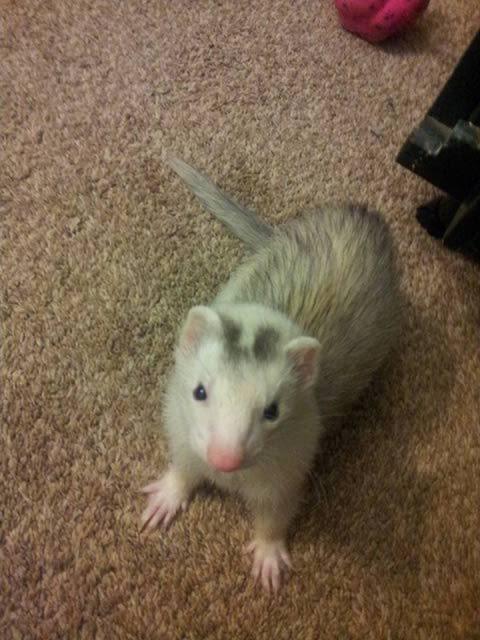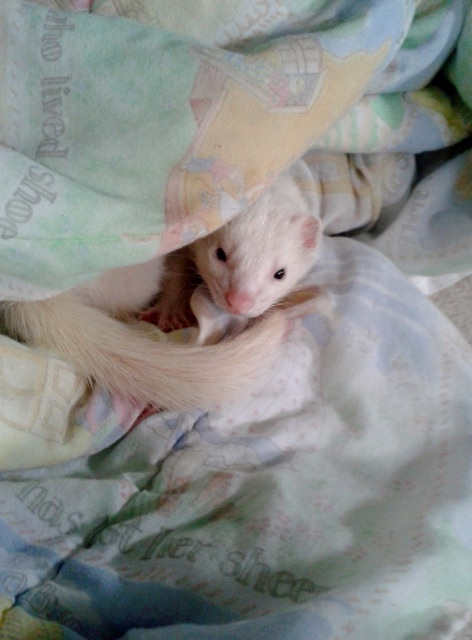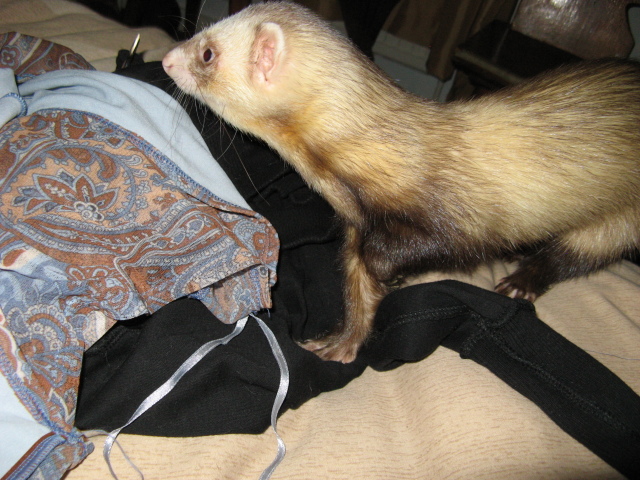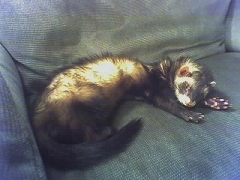QuestionI recently adopted two ferrets from a pet store that had been placed in a dumpster. they were in a cage so Im not worried about them having ingested anything dangerous but one of them is very thin and now three days later has developed diarrhea. is there something I can give her for it. Also, i have the two new ones in the same cage until I get them to a vet (appt next week) but im afraid the boy will get what she has. i recently started caging them and was wondering if she could have gotten it due to the stress of being in the cage...she didn't have it for te two days she ran free. any suggestions?
AnswerHello Betty (whoops, I read your name wrong! Sorry!)
I bet your new ferrets are adorable!! What did you name them? I am certain they LOVE having a place to romp and play besides a stinky dumpster. Thank you so much for taking in these guys.
There can be several things causing the loose stool. I will go over several common causes and one serious condition that would need medical attention ASAP. There is no over the counter medication you can give safely to your ferret. She would need to see a vet and be prescribed medication such as flagyl.
Diet:
The first possibility that comes to mind is diet. What are you feeding her? Any sudden change to a new kibble can cause diarrhea, vomiting and/or pancreatitis. Just for future reference, when changing to a new diet, always mix in the new kibble into the old diet for a few days. This will allow sensitive ferret tummies to get used to the new kind. I know you probably have no idea what sort of diet she was fed at the pet store, so it is difficult to transition the food slowly in this case.
Diet is essential for ferrets, and could proper nutrition could potentially prevent future health problems. You have to be VERY careful... MOST brands are NOT healthy. NOT all brands of ferret food are good to feed! Canned cat food is NOT an appropriate diet to feed him.
With any kibble, the first three ingredients should be meat-based, and not contain by-products since these are mostly devoid of valuable nutrition. Also, the food should be low in carbohydrates (corn, rice, etc) since ferrets are obligate carnivores and cannot digest them.
Here are some brands I recommend:
Wysong Archetypal-1 (beef) or Archetypal-2 (chicken)
http://www.wysong.net/products/archetypal-1-natural-healthy-ferret-food.php
http://www.wysong.net/products/archetypal-2-natural-healthy-ferret-food.php
Wellness Core Feline
http://www.wellnesspetfood.com/cat_wellness_dry_core.html
Innova Ferret EVO (Or cat version if not available)
http://www.evopet.com/products/default.asp?id=1502
Serengeti Cat (Timberwolf brand)
http://www.timberwolforganics.com/Pet-Foods/Serengetii
Wilderness by Blue Buffalo
http://www.bluebuff.com/products/cats/wilderness-cat.shtml
All but the Wysong kibble can be purchased from PetFoodDirect.com I find ordering is far easier than driving all over the state to find some of the more obscure brands such as EVO Ferret and Serengetii Cat.
Brands I Do not recommend: Marshall Farms, Totally Ferret, 8-in-one, IAMS, Kaycee ferret, etc.
This list is by no means all inclusive. There are many other good types available, just check the labels. Not all premium kitten/cat kibble is good for these guys, and not even all brands of ferret-specific food! Every brand is different, and that is why I tend to choose 3 of the best, and create a mixture. I currently feed a mix of Core Wellness, Wilderness and Serengeti Cat, although it varies from month to month with what is available.
I do not recommend feeding a raw diet. Bacteria and other harmful pathogens and can be transferred by feeding raw meat. These can include tapeworms, salmonella, and e-coli.
It is difficult to change a ferret's diet once they have imprinted on a certain brand. Imprinting on certain foods happens at a very young age, and most will turn up their noses to anything else! If you decide to switch brands, always introduce the new type by mixing it in with the old kibble. I generally start with a 25/75 mixture, then increase the amount of new food over the next few days. This allows the sensitive ferret tummies and taste buds to get used to the new diet. Changing food too quickly can result in nasty vomiting and diarrhea.
Remember to store all extra food in airtight containers (Such as for cereal storage). If you buy three kinds of kibble, it will last you awhile! Also, change the kibble in your ferret's bowl DAILY. Some types (such as those that contain vitamin E) can go rancid quickly and cause stomach problems.
Also, stay away from vegetables, fruits and milk products as treats. Raisins can cause kidney failure, and too much sugar (anything that ends with -ose) can lead to insulinoma and other complications. I feed my guys dehydrated 100% chicken treats with no additives as snacks. These can be found in the canine section of your local pet store. Another obscure (but healthy) treat is live meal worms. These can be found at any pet store, and I haven't met a ferret who didn't love them yet.
There is a short FAQ that contains some info on nutrition from the AFA's Official Website:
http://www.ferret.org/read/faq.html
Remember... Always check the ingredients for whatever you buy, since most store bought brands are not good for the little guys! You will notice a BIG change in your ferret's coat health and condition once you switch to a healthier diet.
Stress:
The second possibility is stress. She has just moved to an unfamiliar environment with a new and strange person. It will take her time to get used to you, the house and the new life! Any stress can cause GI problems, including diarrhea. Keep her in a quiet location to minimize stress. Keep any loud noises to a minimum and speak quietly to her. If there are other pets in the house, let them interact for short periods of time. Monitor ALL interaction carefully. Never let two pets play alone together (except for her cage buddy.. most ferrets get along well together).
Intestinal Parasites:
Has your veterinarian checked for any parasites? Since she was found outside, it is a possibility she picked up some worms. Roundworms and coccidia can certainly cause these symptoms. You should bring a fecal sample to your vet for evaluation to rule out intestinal parasites.
GI blockage:
You mentioned that it is unlikely she ingested anything, but I want to be thorough and cover all of the possibilities. Is she eating and drinking normally? Is there any vomiting associated with the diarrhea? Does her stomach seem painful or distended? How does her stool look; is it small amounts of frequent diarrhea?
If you have answered yes to any of the above questions, you might be facing an intestinal obstruction. This happens when ferrets ingest foreign material such as rubber, cloth, etc. When they are young, they get into everything, so do not rule this out as a possibility. She could have eaten something before you bought him while he was at the pet store.
Intestinal blockages are SERIOUS and require immediate emergency surgery. To ensure this is not the cause for the diarrhea, you would need to have her evaluated by your vet ASAP. An x-ray could tell if something is stuck in there. Even if it is not a material that would be seen on a film, the gastric pattern of an obstruction are usually enough to diagnose the problem.
I am not saying that she definitively has an obstruction. I want you to be aware that it does happen, and it is VERY serious and life threatening. If you notice any vomiting, lethargy, painful belly or a decrease in appetite... bring her to a vet ASAP. She would need IMMEDIATE treatment.
What to do in the meantime:
Monitor her closely. Make sure she is eating and drinking well (ferrets need to eat every 4-6 hours). This is ESSENTIAL since ferrets can waste very quickly. Watch her stool and see if it improves. One thing you DO want to be careful of is dehydration. Do not let the diarrhea persist for much longer without seeking veterinary attention. Dehydration alone can be fatal if it goes on for too long. If it hasn't cleared up by now, and even if there are no other problems besides to loose stool, have him seen as soon as you can.
How can you watch for dehydration?
Does her skin seem to "stay up" when you scruff him? Are her gums tacky to the touch? Are pasty in color or white? Dehydration is SERIOUS so please monitor for any changes! If you answered YES to the above, he can be seriously dehydrated. She may need IV or subcutaneous fluids to help add fluid to her body. Even if she IS eating and drinking, she is constantly loosing the water in the diarrhea. This is why it is VITAL that you monitor her closely. If she appears dehydrated, bring her immediately to an emergency clinic if your veterinarian is not open. This is a serious condition.
Have her seen by your vet to rule out an obstruction and help any dehydration. Have her seen ASAP, especially if the diarrhea has continued. Make sure you are feeding appropriate food and in the future, switch brands slowly.
You should separate her from your other ferret until she is seen by a vet. This is mostly so you can monitor her fluid/food intake and her diarrhea. It is very difficult to observe what she is eating and drinking with two ferrets in the same cage.
I hope this answers your question! Sorry that my response is so lengthy, but I wanted to cover all of the important points =3 If you have any other questions, you know where to find me. Good luck!
-Cindy P.
As a side note, there is a condition called ECE "green slime" that ferrets can get. It causes a BRIGHT green persistent diarrhea. This is serious and would need medical attention immediately. Since you did not mention any green color to the stool, I am not worried that this is the cause. I do want you to be aware of it.

 ferret loneliness
Question
Mostar
I am a new owner of a single fer
ferret loneliness
Question
Mostar
I am a new owner of a single fer
 Female Behavior Issues
QuestionQUESTION: I have had Ryoko, my female ferret, f
Female Behavior Issues
QuestionQUESTION: I have had Ryoko, my female ferret, f
 My ferret, Cloud
QuestionQUESTION: I used to have 2 ferrets who were ver
My ferret, Cloud
QuestionQUESTION: I used to have 2 ferrets who were ver
 I think my ferret is to thin?
Question
Photo of Ferret
Hi
I think my ferret is to th
I think my ferret is to thin?
Question
Photo of Ferret
Hi
I think my ferret is to th
 SWOLLEN FEMALE PARTS
QuestionSmokey napping
QUESTION: Hello, I have a
SWOLLEN FEMALE PARTS
QuestionSmokey napping
QUESTION: Hello, I have a